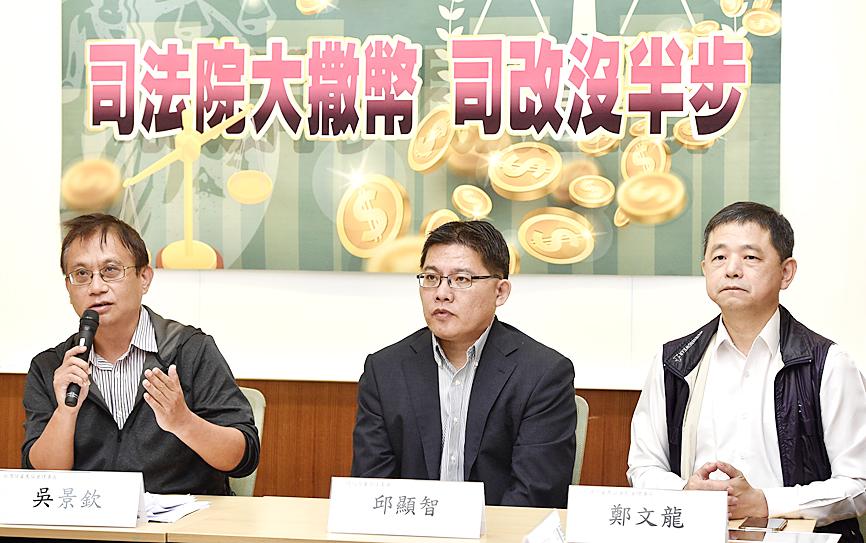A Judicial Yuan plan to budget NT$120 million (US$4.15 million) next year for a public marketing campaign to promote a lay judge system is an attempt to mislead society on “wrongly implemented” reforms, a civic group said yesterday.
The Taiwan Jury Association, which has been pushing for a jury system instead of the government’s preferred lay judge approach, said the Judicial Yuan should face up to the core judicial reform issues that need to be addressed.
The Judicial Yuan should promote impartial trials and improve the judiciary for those working within it, rather than throwing money at “propaganda,” the association said.

Photo: George Tsorng, Taipei Times
The Judicial Yuan has proposed a budget of NT$220 million for next year, of which NT$120 million was earmarked for the promotional campaign.
The campaign would feature television, film, radio and online components, and the Judicial Yuan plans to hire Internet celebrities and a professional spokesperson, association president Wu Ching-chin (吳景欽) said.
“A recently proposed amendment to the Criminal Compensation Act (刑事補償法) would award victims of judicial miscarriage between NT$160,000 and NT$360,000,” New Power Party Legislator Chiu Hsien-chih (邱顯智) said. “How is it that the government can only provide such a small amount to those who have gone through such suffering, while spending such a large amount on propaganda?”
The Judicial Yuan must squarely face its errors to gain the public’s trust, he said.
For example, it could systematically research what led to miscarriages of justice, Chiu said.
The Judicial Yuan should explain why such a large budget is needed for a promotional campaign, association founder Jerry Cheng (鄭文龍) said, adding that over the course of a year fewer than 600 cases would be tried using lay judges.
“If no improvements are made to judicial proceedings, then what is the point of hiring Internet celebrities to promote the system?” he said.
Internet Gazette Law Paper (法治時報社) publisher and legal expert Huang Yueh-hung (黃越宏) said that the Judicial Yuan was using taxpayer money to promote its lay judge system, while abandoning a proposed jury system, which the Democratic Progressive Party calls for in its charter.

Taiwan has received more than US$70 million in royalties as of the end of last year from developing the F-16V jet as countries worldwide purchase or upgrade to this popular model, government and military officials said on Saturday. Taiwan funded the development of the F-16V jet and ended up the sole investor as other countries withdrew from the program. Now the F-16V is increasingly popular and countries must pay Taiwan a percentage in royalties when they purchase new F-16V aircraft or upgrade older F-16 models. The next five years are expected to be the peak for these royalties, with Taiwan potentially earning

STAY IN YOUR LANE: As the US and Israel attack Iran, the ministry has warned China not to overstep by including Taiwanese citizens in its evacuation orders The Ministry of Foreign Affairs (MOFA) yesterday rebuked a statement by China’s embassy in Israel that it would evacuate Taiwanese holders of Chinese travel documents from Israel amid the latter’s escalating conflict with Iran. Tensions have risen across the Middle East in the wake of US and Israeli airstrikes on Iran beginning Saturday. China subsequently issued an evacuation notice for its citizens. In a news release, the Chinese embassy in Israel said holders of “Taiwan compatriot permits (台胞證)” issued to Taiwanese nationals by Chinese authorities for travel to China — could register for evacuation to Egypt. In Taipei, the ministry yesterday said Taiwan

‘LIKE-MINDED PARTNER’: Tako van Popta said it would be inappropriate to delay signing the deal with Taiwan because of China, adding he would promote the issue Canadian senators have stressed Taiwan’s importance for international trade and expressed enthusiasm for ensuring the Taiwan-Canada trade cooperation framework agreement is implemented this year. Representative to Canada Harry Tseng (曾厚仁) in an interview with the Central News Agency (CNA) said he was increasingly uneasy about Ottawa’s delays in signing the agreement, especially as Ottawa has warmed toward Beijing. There are “no negotiations left. Not only [is it] initialed, we have three versions of the text ready: English, French and Mandarin,” Tseng said. “That tells you how close we are to the final signature.” Tseng said that he hoped Canadian Prime Minister Mark Carney

POSITIVE DEVELOPMENT: Japan and the US are expected to hold in-depth discussions on Taiwan-related issues during the meeting next month, Japanese sources said The holding of a Japan-US leaders’ meeting ahead of US President Donald Trump’s visit to China is positive news for Taiwan, former Japan-Taiwan Exchange Association representative Hiroyasu Izumi said yesterday. After the Liberal Democratic Party’s landslide victory in Japan’s House of Representatives election, Japanese Prime Minister Sanae Takaichi is scheduled to visit the US next month, where she is to meet with Trump ahead of the US president’s planned visit to China from March 31 to April 2 for a meeting with Chinese President Xi Jinping (習近平). Japan and the US are expected to hold in-depth discussions on Taiwan-related issues during the